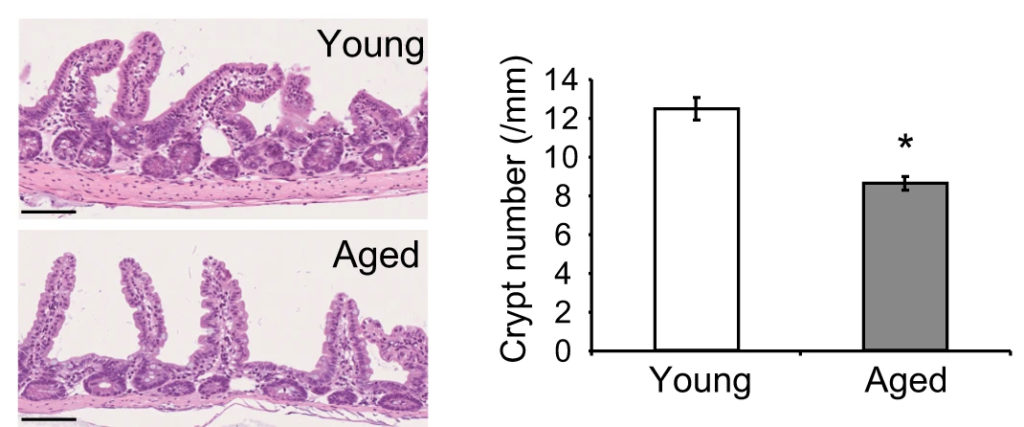NMN Ameliorates Gut Aging in Mice
Aged mice supplemented with NMN see improvements in gut stem cell activity and function.
The ability of stem cells to self-renew and differentiate into mature cells is crucial for tissue maintenance and healing in response to injuries. Stem cells persist in the body throughout one’s lifetime, which makes them susceptible to cellular damage that eventually results in cell death and loss of abilities to regenerate tissue, a process referred to as “stem cell aging.”
Regulating stem cell aging might produce an intervention to maximize healthy life expectancy. To achieve this, scientists need to understand the cellular processes involved in stem cell survival, self-renewal, and proliferation.
Scientists from Keio University in Japan found reduced activity of a gene, Lgr5, in aged intestinal stem cells resulted in decreased cell proliferation along with activation of aging-related genes. Administering nicotinamide mononucleotide (NMN), a molecule that boosts levels of nicotinamide adenine dinucleotide (NAD+) in cells, ameliorated these age-related effects on the cells.
Older Guts Have Smaller Pools of Stem Cells
The intestinal lining has protrusions composed of cells called “villi” that look like fingers under a microscope. Between these finger-like protrusions sit valleys called “crypts” harboring intestinal stem cells. Comparing young to older intestinal linings showed fewer villi and fewer crypts in the aged mice. These results indicated reduced cell proliferation during aging since villi and crypts require cell proliferation for their formation.

Upon performing gene activity analysis, the researchers found the decreased cell proliferation is due to reduced activity of the gene Lgr5. Lgr5 encodes a protein involved in a cellular mechanism leading to cell proliferation. Reduced Lgr5 gene activity results in reduced cell proliferation, which explains the lower numbers of crypts and villi in aged mouse intestines.
NMN Inhibits Senescence of Gut Organoids From Aged Mice
NMN treatment of a cluster of aged intestinal stem cells, organoids, resulted in increased cell proliferation. NMN increased the levels of NAD+ in these cells, increased the activity SIRT1, a protein that maintains cellular health by removing and adding molecular tags on DNA and proteins. These results suggest using NMN to increase cellular NAD+ levels could improve cell proliferation in intestinal stem cells in mice.

The researchers noted the organoids derived from aged animals could be a powerful research tool for investigating stem cell aging and for developing anti-aging interventions.
“Further studies to validate our results using human materials will be essential, and may lead to treatments that can prolong healthy life expectancy,” stated the scientists in their study with reference to using human cells in future research.

